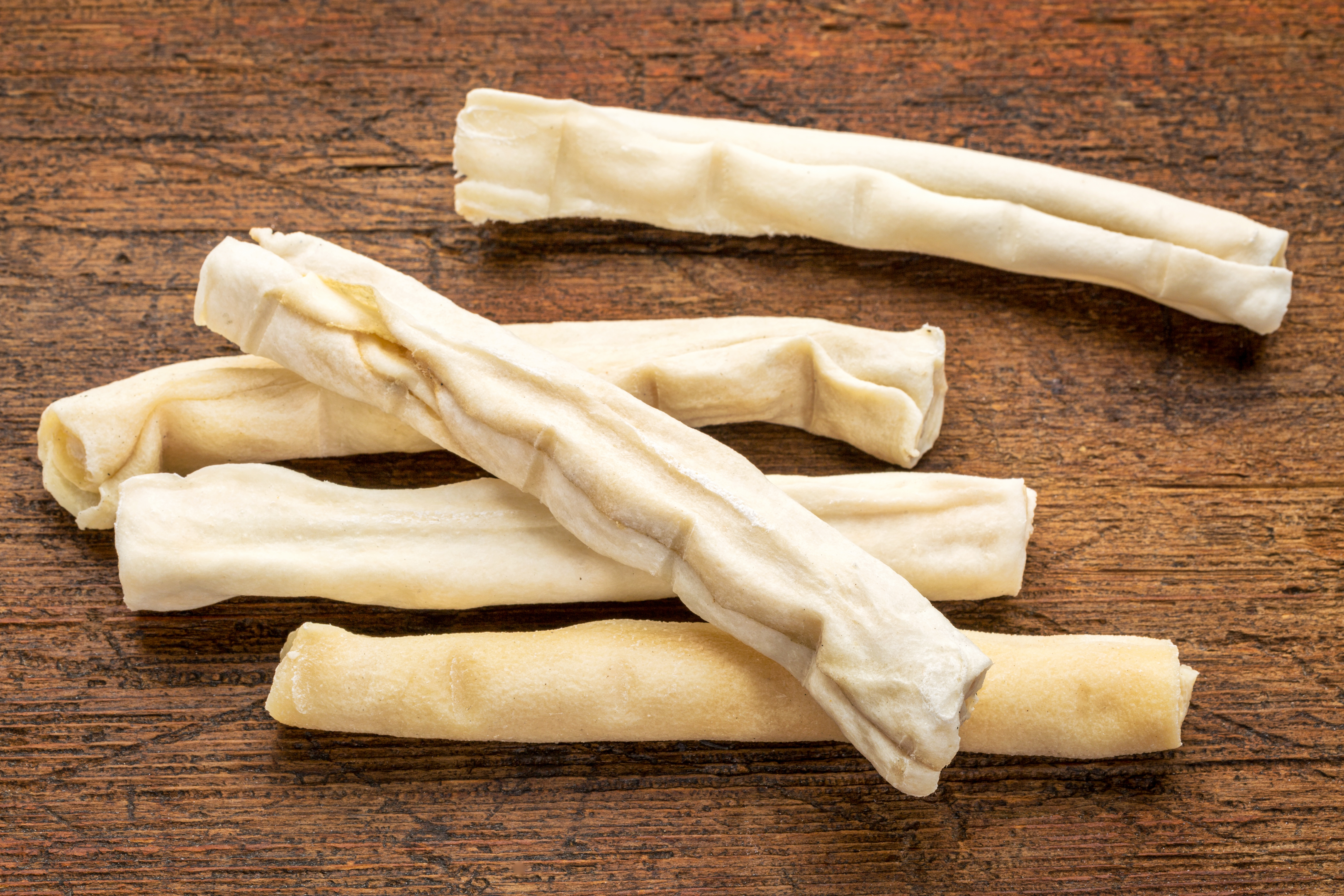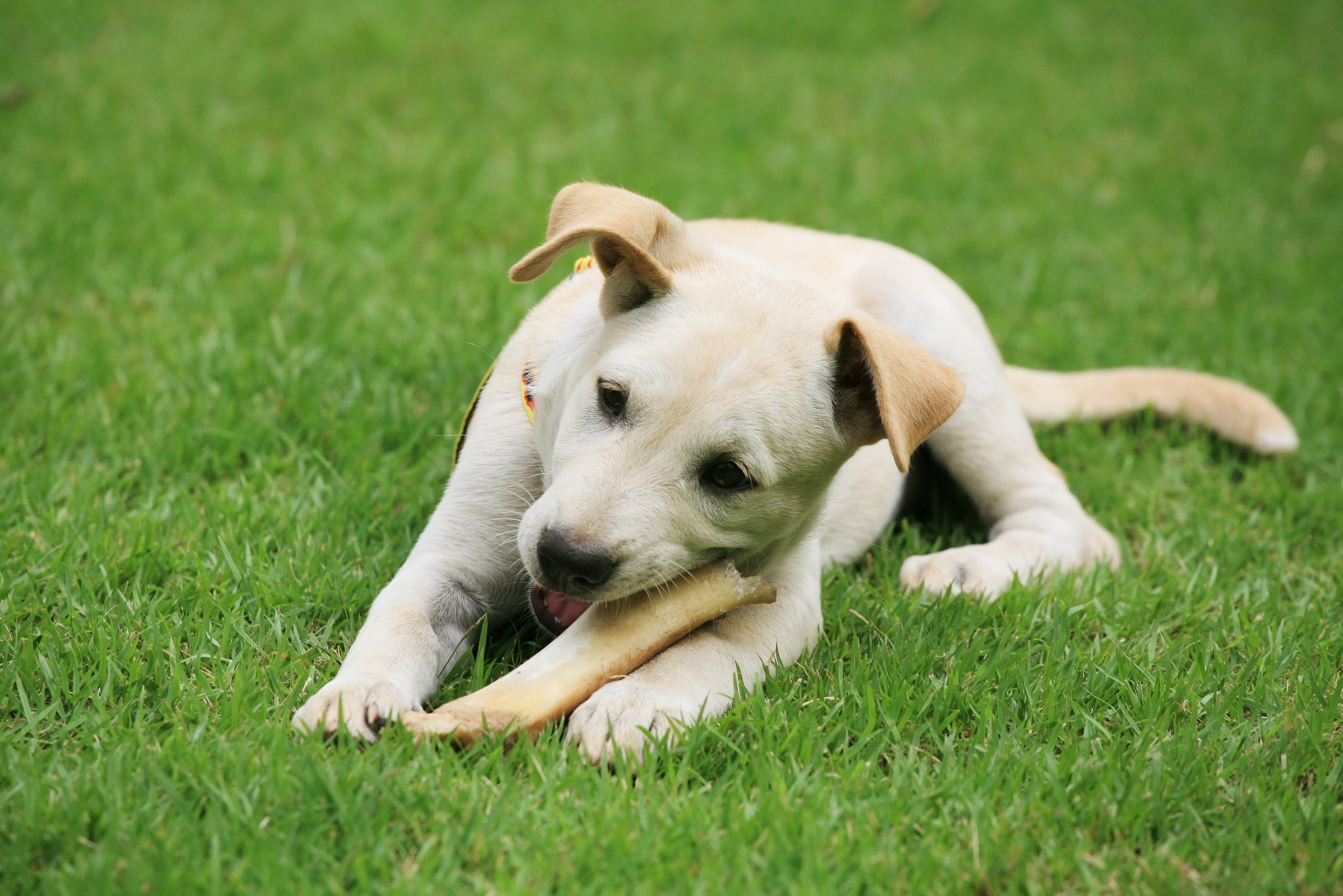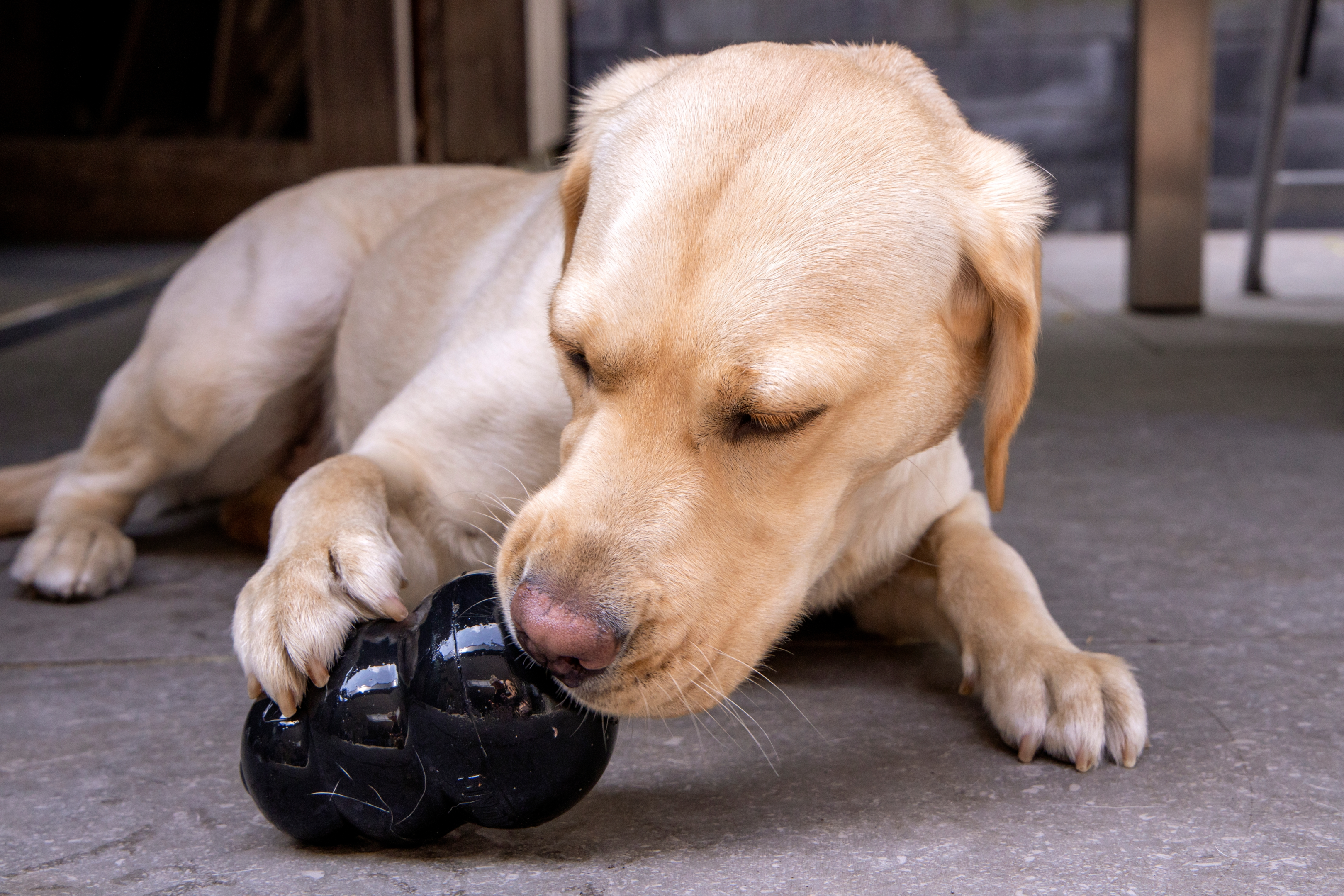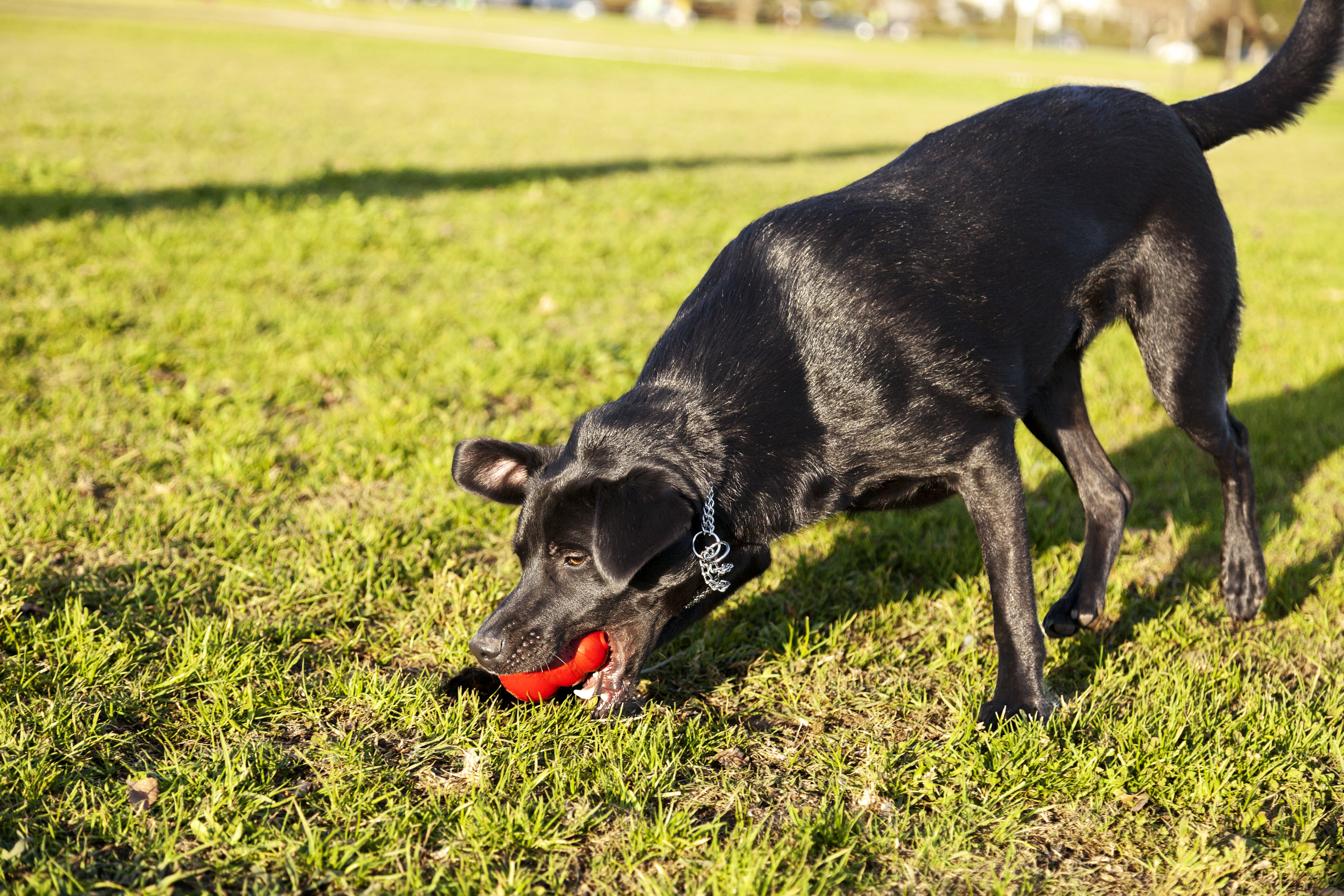
Something to Chew on: Is Rawhide Safe for Your Dog? Do’s and Don’ts and Safety Tips

No bones about it: dogs are natural chewers, and they need an outlet for this fundamental instinct. The act of chewing itself is mentally stimulating and comforting, especially for teething puppies. It can improve oral health and even relieve anxiety. One popular way to meet the insatiable chewing needs of a dog?
Rawhide.
These chewy treats are everywhere, but are they a good idea for your beloved furry friend? Or is rawhide bad for dogs? Is there such a thing as a healthy chewing experience without the risk of harm?
In this blog, let’s explore the benefits, precautions, and alternatives for rawhide goodies so you can make an informed decision for your pet.
What is Rawhide?
Rawhide chews are byproducts of the leather industry. Made from the inner layer of dried cow or horse hides, they’re fashioned into many forms—from traditional rawhide bones to various shapes and sizes, including rawhide dog chews. Pressed into chewable treats and often enhanced with appealing flavors such as beef, chicken or liver, it’s no wonder dogs love them.
However, these seemingly harmless dog treats carry a darker side. Rawhide dog treats carry inherent risks; they can be choking hazards, cause digestive issues, and expose your pet to harmful chemicals. But many dog owners remain unaware of the risks, leaving their dogs vulnerable.

The Hidden Dangers of Rawhide Chews
As pet owners, we strive to provide the best for our furry friends, but sometimes what seems like a harmless treat can hide potential dangers. So let’s get to the core question: is rawhide actually bad for dogs?
Choking Hazards
Does this sound familiar? Your dog is joyfully chewing on their favorite rawhide when a piece breaks off, potentially causing a life-threatening obstruction. This is not a far-fetched scenario. Rawhide chews can break into large pieces, and if the dog swallows it, it could cause a choking hazard—particularly for dogs with a more aggressive chewing style.
The danger doesn’t stop at the mouth. There have been documented cases of dogs with pieces of rawhide lodged in their windpipe, stomach, or intestines, creating choking hazards and an intestinal blockage. Adult dog or puppy, and regardless of breed or size, any dog can be at risk if they consume a rawhide chew that is too small for their size or if they break off large chunks without properly chewing them.
It’s important to choose appropriately sized treats with the right shape for your dog; don’t risk the chew getting stuck in their throats!
Digestive Issues
While rawhide may pass the taste test for large, small, and medium-sized dogs, it’s often a different story once it hits their digestive system. Rawhide treats made from low-quality, unnatural materials could contain harmful additives, flavors, and preservatives. Since rawhide is a byproduct of leather, some items pose a significant challenge to a dog’s digestive system when it comes to breaking down.
Not only can rawhide dog chews break teeth, but they’re hard to digest and may cause blockages in the digestive tract. If large pieces are swallowed, they can become lodged in the esophagus or further down the digestive tract, requiring emergency abdominal surgery to remove them. To avoid a distressing situation for your dog (and a distressing vet bill for you), make sure you discard pieces of chewed up rawhide before your dog has the opportunity to swallow them.
Toxic Chemicals
Beyond the physical dangers, rawhide chews carry an invisible threat: toxic chemicals. The chemicals involved in rawhide processing can be harmful, so before you give a chew toy to your dog, rinse and dry it thoroughly. However, note that traces of chemicals may still remain, even after washing.
During the manufacturing process, rawhide is often soaked in a cocktail of chemicals to preserve it and enhance its flavor. These chemicals can include formaldehyde or chromium salts, which may pose risks to adult dogs and young puppies alike. You might still choose rawhide products your dog, but it’s a good idea to check that any brined hides your dog consumes don’t contain these harmful substances—because pet stores may not be monitoring this. Be aware of behavioral changes in your dog or signs of illness, such as vomiting or diarrhea.
Expert Opinions on Rawhide
While our dogs may not understand the dangers of rawhide, the experts sure do. The Humane Society and ASPCA discourage the use of rawhide chews for dogs due to the potential risks associated with them, including:
- Choking hazards
- Digestive problems
- Internal blockage
- Potential for bacterial contamination
Some animal welfare organizations and veterinary professionals have also raised concerns about the these potential risks associated with rawhide chews. To make sure your pet is as safe and happy as possible, check with your veterinarian and consider other possible chew options.
Choosing the Right Rawhide for Your Dog
If you still decide to offer your dog rawhide chews, pick wisely. All rawhide is not created equal, and choosing high-quality products made in the United States can help to minimize potential danger.
However, even the highest quality rawhide comes with risks. Keep a close eye on your dog while they chew, and take the rawhide away when it becomes small enough to be swallowed or choked on. By paying attention, you can ensure your dog’s chew time is both enjoyable and safe.
Tasty and Safe Alternatives to Rawhide

Maybe your dog is in love with his rawhide chew, but you’d rather not expose him to the risks we’ve outlined above. What else can he gnaw on safely? Good news: there are plenty of tasty and safe rawhide alternatives out there to satisfy your dog’s natural instinct to chew.
Bully Sticks
These chews provide a long-lasting and healthy chew alternative for many dogs. While they can present a choking hazard when they become small nubs, choosing high-quality bully sticks from trusted sources can minimize this risk. Plus, they offer some nutritional benefits, being an excellent source of protein and omega-3 fatty acids.
Dental Chews
Dental chews offer another safer alternative to rawhide. They can clean teeth and provide a range of benefits for a dog’s dental health, such as removing plaque and tartar buildup, massaging the gums, and reducing bad breath.
However, keep in mind that dental chews shouldn’t be the main factor working toward your dog’s dental health. They should not replace regular tooth brushing or professional dental care routines for your dog’s teeth.
Synthetic Chew Toys
For dogs who love to chew, there are many branded options that are safe and effective at curbing boredom. Be aware that you should monitor your pup for fractured or injured teeth with very hard chews. Some of the long lasting chew products that get high marks include: Kong, Goughnuts and West Paws made with Zogoflex. Benebone and Nylabone are also good alternatives.
Supervise Your Dog: Monitoring Your Dog’s Chewing Habits
No matter what type of chew you pick to keep your dog occupied, one rule remains: supervision is key. Observing your dog’s chewing habits can prevent potential health issues. Unmonitored chewing may result in:
- broken teeth
- dental problems
- bloody or infected gums
- skin sores
- ingestion of hazardous objects.
Always keep a close eye on your dog’s chew time to ensure they’re engaging in safe, healthy dog chew habits that cater to their individual chewing style.
In the world of dog chews, it’s clear that rawhide isn’t the innocent treat it might seem. Their potential dangers include choking hazards, digestive issues, and exposure to toxic chemicals, so it’s critical for dog owners to make informed choices and prioritize their pet’s safety above all else.
Whether you choose to stick with rawhide, opt for safer alternatives, or mix and match, always monitor your dog’s chewing habits and consult with a veterinarian for the best advice.
Frequently Asked Questions

Do vets recommend rawhide for dogs?
Although some veterinarians may recommend rawhide chews as a healthy alternative to chewing on shoes or furniture, and beneficial for a dog’s oral health, many would caution pet owners regarding rawhide. Because of potential health risks and hazards some rawhide treats pose, always check with your vet about reputable products.
Is rawhide bad for dogs?
Rawhide bones and other edible chews can be dangerous for dogs, as they can cause choking and intestinal blockages. Dogs that swallow large pieces of rawhide without chewing can end up with it stuck in the esophagus or other parts of the digestive tract, potentially leading to life-threatening health problems.
Does rawhide dissolve in the stomach?
No, rawhide does not dissolve in the dog’s stomach. Instead, it can swell up, creating a risk of bowel blockage.
What alternatives are there to rawhide?
Alternative chewing options for dogs include bully sticks, dental chews, and reputable synthetic chews. Safe rubber toys that can be filled with treats or peanut butter offer mental stimulation and a safe outlet for chewing.
How can I ensure my dog’s safety when they’re chewing?
To ensure your dog’s safety when they’re chewing, it’s important to supervise them and remove the chew if it gets small enough to swallow or choke on. Throw away pieces of chewed-up rawhide before they cause trouble.
Try stuffing a Kong with kibble, get the kibble wet, then freeze it. This can be a nice alternative to a high-calorie peanut butter treat. It will also keep the dog occupied for longer and provide a similar caloric intake and level of nutrition they need.
How can I tell if my dog has a gastric irritation or a blockage?
Call your vet immediately if you see these:
- gagging
- regurgitation
- repeated swallowing
- vomiting
- diarrhea
- fever
- lack of energy
- signs of pain
- refusal to eat
- straining with bowel movements, or being unable to go
Key Takeaways
Remember, every dog has an individual chewing style. if your dog is an enthusiastic or powerful chewer, rawhide chews might be a bad idea entirely. Use good judgement as you would for any health or lifestyle consideration for your furry best friend.
- Rawhide chews can present hidden dangers such as choking hazards, digestive issues and contamination with toxic chemicals.
- Experts advise against rawhide for dogs due to potential risks, but high-quality, U.S.-sourced products may be safe when monitored closely.
- Alternatives such as bully sticks, dental chews, and safe, synthetic chews offer a healthy chewing experience without the risk of harm to your sweet dog’s teeth or health.
About Dogs Inc

Would you like to learn more about the life-changing dogs that we breed, train, and match with the people who need them?
Find doggone great stories, photos, and videos about guide and service dogs at Dogs Inc.
Learn more about our mission—or even tour our campus! Discover how our guide dogs, service dogs, and Skilled Companion Dogs bring all good things to life for adults and children facing significant challenges.
You Might Also Be Interested In:
Ask the Vet: 13 Common Houseplants that are Toxic to Dogs

